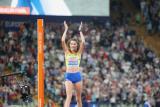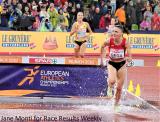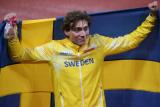Folders |
Mondo Duplantis, Femke Bol and Luiza Gega Enjoy Memorable Nights at European Athletics ChampionshipsPublished by
Duplantis surpasses own pole vault championship record for back-to-back crowns, Bol becomes second Dutch female athlete to win three titles in same year in meet history and Gega gets first gold medal for Albania in any event with 3,000 steeplechase victory; Spotakova, 41, rallies for javelin bronze By Erik Boal, DyeStat Editor Whether it was the masterful pole vault performance of Armand “Mondo” Duplantis, the magnificent 4x400-meter relay anchor leg of Femke Bol or the magnitude of the 3,000 steeplechase victory produced by Luiza Gega, it was a memorable Saturday night in Munich, Germany at the European Athletics Championships. Duplantis surpassed his own meet record with a first-attempt clearance at 19 feet, 10.50 inches (6.06m) at Olympic Stadium to secure back-to-back titles for Sweden, producing the 51st 6-meter clearance of his career. Bol became only the second Dutch female athlete to earn three gold medals at the same European Championships, adding to her victories in the 400 hurdles and 400 meters, by rallying The Netherlands to the 4x400 victory in 3 minutes, 20.87 seconds. And Gega became the first Albanian athlete to capture gold in any event in meet history, achieving a European Championships record by clocking 9:11.31. There was also a generational showdown in the women’s javelin throw final, with Greece’s Elina Tzengko, 19, becoming the youngest female athlete in meet history to win any throwing event by securing the title with a second-round throw of 215-11 (65.81m), finishing ahead of 18-year-old Serbian Adriana Vilagos. Completing the podium was 41-year-old world-record holder Barbora Spotakova of the Czech Republic, who became the oldest women’s medalist in any field event at the European Championships. Duplantis, who won his first European title at age 18 in 2018 in Berlin, became the first to repeat since close friend Renaud Lavillenie of France earned three straight titles in 2010, 2012 and 2014. “Coming to the stadium, somebody told me there was a rainbow, but I did not see it. It is super beautiful. I wish I saw it. Honestly, it was a great evening. Considering the situation and circumstances, I cannot complain. It was very special for me today,” said Duplantis, the world indoor and outdoor record holder. “I think this season, I have experienced all kinds of situations and these championships were very special to me. The crowd was very special, it is a special place here. That 6.06m jump is something I will always remember because of the roar of the crowd. When I was coming down the runway, they were so loud.” Bo Kanda Lita Baehre earned the first men’s pole vault medal for Germany since 2012 by taking silver with a 19-2.25 (5.85m) clearance and Pal Haugen Lillefosse achieved the first medal in the event in Norwegian history by clearing 18-10.25 (5.75m) on his first event to grab bronze. Sondre Guttormsen, NCAA Division 1 indoor and outdoor champion at Princeton, also cleared 18-10.25 for Norway, but finished sixth overall based on earlier misses. Gega, 33, also became the oldest female athlete to win the 3,000 steeplechase, along with producing the breakthrough for her country by eclipsing the meet record of 9:17.57 established in 2010 by Russian competitor Yuliya Zaripova. Gega finished fifth July 20 at the World Championships in a national-record 9:10.04. “I wanted so much this medal. From the beginning I tried to run hard, I know how to run alone because I train alone, I just tried to stay focused. When I entered the last lap, I just said to myself,, ‘Go Luiza, go, you can make the dream come true,’” Gega said. “This is the first medal for my country Albania, I am so happy. I worked so hard for it, my coach worked so hard with me too. This was a good season and this medal is a dream coming true. Albania is a small country but we can do big things. I hope this medal will motivate kids to start doing and to continue doing athletics. I made it, they can make it, too. This medal also motivates me to work hard in the future.” Germany’s Lea Meyer produced a personal-best 9:15.35 to capture silver with Great Britain’s Lizzie Bird taking bronze in 9:23.18. Alicja Konieczek, a former Western Colorado star, ran a lifetime-best 9:25.15 to finish fourth for Poland, with former New Mexico standout Adva Cohen clocking 9:36.84 for Israel to earn eighth after placing fifth in 2018 in Berlin in a national-record 9:29.74. Bol achieved a 49.38 split on the anchor for The Netherlands to join Eveline Saalberg, Lieke Klaver and Lisanne De Witte in capturing the first women’s 4x400 gold medal in meet history for their country. Klaver, 24, celebrated her 24th birthday by running the second leg. “It was such an amazing race,” Bol said. “I really love to run with my girls and against other runners. This championships feels special to me.” Bol joined Fanny Blankers-Koen, who won the 100, 200 and 80 hurdles in 1950, as the only Dutch female competitors to achieve three gold medals at the same European Championships. “This was really crazy,” De Witte said. “When Femke crossed the finish line, I thought about, ‘Oh my God, Femke is triple European champion.’” Poland, the 2018 champion, edged Great Britain by a 3:21.68 to 3:21.74 margin for second. Matthew Hudson-Smith, Charles Dobson, Lewis Davey and Alex Haydock-Wilson helped Great Britain capture its first men’s 4x400 title since 2014 with a victory in 2:59.35. Belgium, the two-time reigning champion, earned silver in 2:59.49 and France took bronze in 2:59.64, with Spain achieving a national-record 3:00.54 to finish fourth. Tzengko continued a trend for Greece of producing a women’s javelin champion every 20 years, following Anna Verouli in 1982 and Mirela Manjani-Tzelili in 2002 with her lifetime-best on her second attempt, capturing the senior-level title after winning the European U20 gold last year in Estonia. “There have been ups and downs the whole season. I was waiting for the right moment here at the European Championships,” Tzengko said. “I am really excited because after Oregon I told myself, ‘Just relax, you can throw a lot of meters, you just have to do this.’ At my last competition, I threw over 60 meters, so I knew I can throw over 63 meters here at the European Championships, and I did it.” The sixth round provided plenty of drama, with Hungary’s Reka Szilagyi entering the final set of throws in second place, only to finish off the podium in fourth at 198-8 (60.57m). Spotakova achieved a throw of 199-1 (60.68m) to temporarily move into second, only to have Vilagos respond with a mark of 203-5 (62.01m) on her final opportunity to secure silver. “I still can’t believe what just happened. I am really really happy, I just couldn’t imagine that I would win the medal,” Vilagos said. “All the girls are much older and more experienced than me, so I really did not expect to win a medal.” Spotakova, who won gold in 2014 and earned silver in 2006, achieved her second European bronze, along with 2010. “I really don’t know why and how this happened, there must be something about that has driven me throughout my career,” Spotakova said. “It also shows that I have not been working all these years for fun. There will be many happy people back home, in the Czech Republic, all of those who follow and support my career, my coach and my partner who are also here at the stadium supporting me. “I don’t want to say this is the last championships of my career, I have to think about it. The truth is that the other two girls on the podium are 19-20 years old, and that says a lot. Maybe it’s time to give these young girls the stage. Nonetheless, this was indeed a very special evening for me and for the whole Czech Republic.” Another young athlete making a podium appearance was 20-year-old Keely Hodgkinson of Great Britain, winning her first European gold in the 800 meters in 1:59.04, the first title for her country since 2012. The victories by Hodgkinson and the men’s 4x400 helped Great Britain surpass the former Soviet Union with the most gold medals by one nation in European Athletics Championships history with 123 overall. France’s Renelle Lamote earned her third straight silver medal in 1:59.49 and Anna Wielgosz of Poland achieved the first medal for her nation since 2014 by taking third in 1:59.87. Alvaro Martin repeated as men’s 20-kilometer racewalk champion in a personal-best 1:19:11, becoming the first male athlete to secure back-to-back titles since fellow Spaniard Francisco J. Fernandez in 2002 and 2006. Perseus Karlstrom of Sweden achieved the first medal for his country since 1958 by taking silver in 1:19:23, with Spain’s Diego Garcia Carrera earning bronze in 1:19:45. Martin and Garcia Carrera finished first and second in 2018. Antigoni Ntrismpioti of Greece achieved a sweep of both women’s racewalk gold medals to become the first female athlete to win two championships in the same year in meet history. After capturing the 35-kilometer crown Tuesday, Ntrismpioti clocked a personal-best 1:29:03 in the 20-kilometer final, finishing ahead of World Championships silver medalist Katarzyna Zdzieblo of Poland in 1:29:20. Saskia Feige achieved the first women’s racewalk medal for Germany since 2010 by clocking 1:29:25. More news |



















